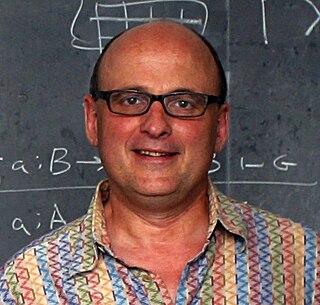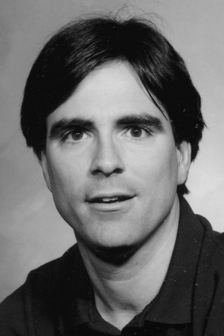
Carnegie Mellon University (CMU) is a private research university in Pittsburgh, Pennsylvania, United States. The institution was established in 1900 by Andrew Carnegie as the Carnegie Technical Schools. In 1912, it became the Carnegie Institute of Technology and began granting four-year degrees. In 1967, it became Carnegie Mellon University through its merger with the Mellon Institute of Industrial Research, founded in 1913 by Andrew Mellon and Richard B. Mellon and formerly a part of the University of Pittsburgh.

The School of Computer Science (SCS) at Carnegie Mellon University in Pittsburgh, Pennsylvania, US is a school for computer science established in 1988. It has been consistently ranked among the best computer science programs over the decades. As of 2024 U.S. News & World Report ranks the graduate program as tied for No. 1 with Massachusetts Institute of Technology, Stanford University and University of California, Berkeley.
In logic, a logical framework provides a means to define a logic as a signature in a higher-order type theory in such a way that provability of a formula in the original logic reduces to a type inhabitation problem in the framework type theory. This approach has been used successfully for (interactive) automated theorem proving. The first logical framework was Automath; however, the name of the idea comes from the more widely known Edinburgh Logical Framework, LF. Several more recent proof tools like Isabelle are based on this idea. Unlike a direct embedding, the logical framework approach allows many logics to be embedded in the same type system.

John Charles Reynolds was an American computer scientist.

Robert William Harper, Jr. is a computer science professor at Carnegie Mellon University who works in programming language research. Prior to his position at Carnegie Mellon, Harper was a research fellow at the University of Edinburgh.

The Human–Computer Interaction Institute (HCII) is a department within the School of Computer Science at Carnegie Mellon University (CMU) in Pittsburgh, Pennsylvania. It is considered one of the leading centers of human–computer interaction research, and was named one of the top ten most innovative schools in information technology by Computer World in 2008. For the past three decades, the institute has been the predominant publishing force at leading HCI venues, most notably ACM CHI, where it regularly contributes more than 10% of the papers. Research at the institute aims to understand and create technology that harmonizes with and improves human capabilities by integrating aspects of computer science, design, social science, and learning science.

Mary Shaw is an American software engineer, and the Alan J. Perlis Professor of Computer Science in the School of Computer Science at Carnegie Mellon University, known for her work in the field of software architecture.

Randolph Frederick Pausch was an American educator, a professor of computer science, human–computer interaction, and design at Carnegie Mellon University (CMU) in Pittsburgh, Pennsylvania.

Manuela Maria Veloso is the Head of J.P. Morgan AI Research & Herbert A. Simon University Professor Emeritus in the School of Computer Science at Carnegie Mellon University, where she was previously Head of the Machine Learning Department. She served as president of Association for the Advancement of Artificial Intelligence (AAAI) until 2014, and the co-founder and a Past President of the RoboCup Federation. She is a fellow of AAAI, Institute of Electrical and Electronics Engineers (IEEE), American Association for the Advancement of Science (AAAS), and Association for Computing Machinery (ACM). She is an international expert in artificial intelligence and robotics.

Gary Lee Miller is an American computer scientist who is a professor of computer science at Carnegie Mellon University. In 2003 he won the ACM Paris Kanellakis Award for the Miller–Rabin primality test. He was made an ACM Fellow in 2002 and won the Knuth Prize in 2013.
Peter Lee is an American computer scientist. He is President and head of Microsoft Research. Previously, he was the head of the Transformational Convergence Technology Office of the Defense Advanced Research Projects Agency and the chair of the Computer Science Department at Carnegie Mellon University. His research focuses on software security and reliability.

Peter William O'Hearn, formerly a research scientist at Meta, is a Distinguished Engineer at Lacework and a Professor of Computer science at University College London (UCL). He has made significant contributions to formal methods for program correctness. In recent years these advances have been employed in developing industrial software tools that conduct automated analysis of large industrial codebases.
Srinivasan "Srini" Seshan is an American computer scientist and a professor of computer science at Carnegie Mellon University, specializing in computer networks.

Eric Poe Xing is an American computer scientist whose research spans machine learning, computational biology, and statistical methodology. Xing is founding President of the world’s first artificial intelligence university, Mohamed bin Zayed University of Artificial Intelligence (MBZUAI).

Prasad V. Tetali is an Indian-American mathematician and computer scientist who works as a professor at Carnegie Mellon University. His research concerns probability theory, discrete mathematics, and approximation algorithms.
Jessica K. Hodgins is an American roboticist and researcher who is a professor at Carnegie Mellon's Robotics Institute and School of Computer Science. Hodgins is currently also Research Director at the Facebook AI Research lab in Pittsburgh next to Carnegie Mellon. She was elected the president of ACM SIGGRAPH in 2017. Until 2016, she was Vice President of Research at Disney Research and was the Director of the Disney Research labs in Pittsburgh and Los Angeles.

Darren Robert Gergle is an American Professor in Communication Studies and Computer Science at Northwestern University. He currently holds the AT&T Research Professorship in Communication at Northwestern University where he directs the Collaborative Technology Lab (CollabLab). The locus of his research centers on human-computer interaction and social computing. He focuses on the application of cognitive and social psychological theories to the design, development and evaluation of ground breaking communication technologies. His work is supported through grants from the National Institute of Mental Health, National Science Foundation, Google, Microsoft Research and Facebook.
Maria-Florina (Nina) Balcan is a Romanian-American computer scientist whose research investigates machine learning, algorithmic game theory, theoretical computer science, including active learning, kernel methods, random-sampling mechanisms and envy-free pricing. She is an associate professor of computer science at Carnegie Mellon University.

Gerald Penn is an American computer scientist specializing in mathematical linguistics and speech processing. He is a Professor of Computer Science at the University of Toronto, a senior member of IEEE and AAAI, and a past chair of Association for Mathematics of Language.

Kenneth L. McMillan is an American computer scientist working in the area of formal methods, logic, and programming languages. He is a professor in the computer science department at the University of Texas at Austin, where he holds the Admiral B.R. Inman Centennial Chair in Computing Theory.















